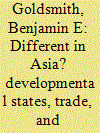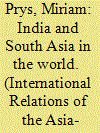|
|
|
Sort Order |
|
|
|
Items / Page
|
|
|
|
|
|
|
| Srl | Item |
| 1 |
ID:
119485


|
|
|
|
|
| Publication |
2013.
|
| Summary/Abstract |
ASEAN's engagement with human rights is characterized by an action-identity gap; member states have created impressive regional commitments while continually violating rights domestically. This gap suggests that member states of ASEAN have used rights for political ends, the enhancement of ASEAN's legitimacy in the eyes of critics, not because they are understood as morally correct. The strategic use of norms indicates that existing recourse to constructivist accounts of norms in ASEAN, currently the dominant explanatory framework, is incorrect. This article argues that an alternative, rational choice, framework for appraising norms within ASEAN offers greater explanatory insight into how and why human rights emerged into ASEAN after 1997. This argument suggests a revised approach to understanding norm violation within ASEAN and through that a more accurate appraisal of the nature of contemporary ASEAN.
|
|
|
|
|
|
|
|
|
|
|
|
|
|
|
|
| 2 |
ID:
119484


|
|
|
|
|
| Publication |
2013.
|
| Summary/Abstract |
In this article, I ask what might be the effect of international trade on interstate conflict in Asia and the Pacific. Overall, the associations of trade interdependence and trade volume in the region appear similar to those globally: interdependence is accompanied by a reduction in the chance of militarized conflict onset, whereas the volume of trade appears to reduce the chance of conflict escalation to deadly international violence. I suggest a partial exception for East Asia, implying weaker associations between trade and pacific outcomes. I argue that the regionally common 'developmental state' model allows such states to more freely, but less credibly, use trade as a foreign policy tool, reducing trade's constraint upon East Asian states in security affairs. Analyses of East Asian dyads and of developmental states in data from all regions of the globe support my contention that trade interdependence has weaker pacific effects in these contexts, although some other expectations are not supported.
|
|
|
|
|
|
|
|
|
|
|
|
|
|
|
|
| 3 |
ID:
119486


|
|
|
|
|
| Publication |
2013.
|
| Summary/Abstract |
The role that peer pressure plays in efforts by member nations of the Association of Southeast Asian Nations (ASEAN) in socializing a reluctant or recalcitrant member(s) toward a diplomatic posture or policy position has been noted but not systematically addressed in the existing literature. Given that the decision-making in ASEAN has traditionally been a consensus-based, political suasion is therefore the key modality through which ASEAN members develop shared perspectives and, where possible, ensure collective assent to an existing or emerging norm or position. Peer pressure is likely the only means available for ASEAN states to promote 'voluntary compliance' without contravening their institution's non-interference principle. Three historical developments are examined: Indonesia and the formation of ASEAN, the establishment of the ASEAN Charter, and the constructive engagement of Myanmar. In all three instances, force-based coercion did not play a role, but persuasion did.
|
|
|
|
|
|
|
|
|
|
|
|
|
|
|
|
| 4 |
ID:
119487


|
|
|
|
|
| Publication |
2013.
|
| Summary/Abstract |
Regions and the regional powers that characterize them stand in multiple inter-relations with the world system. Yet, theories of International Relations struggle with the conceptualization of this global-regional nexus. This article introduces an analytical tool that allows for the evaluation of the 'embeddedness' of regions into the international system and its consequences for a regional power in 'its' region. The theoretical tool shows in particular that regional powers do not necessarily have an inherent interest in 'their' region and its stabilization or, in general, the provision of public goods. Instead, global interests can prevail. Thus, the decision to engage positively in the region is one that does not automatically follow from relative preponderance as it is assumed by many analysts of regional powerhood in the case study chosen here, South Asia, and across the globe. The applicability of this analytical tool is illustrated with the help of two specific examples - India's conflict management in Sri Lanka and its role in the democratization process in Nepal.
|
|
|
|
|
|
|
|
|
|
|
|
|
|
|
|
| 5 |
ID:
119488


|
|
|
|
|
| Publication |
2013.
|
| Summary/Abstract |
This article uses the so-called English School of International Relations (ES) as a lens through which to examine Indonesia's trajectory as a regional power and a would-be world power. The ES approach has always emphasized the social dimensions of great-power status, which factor in, alongside material components, a mutual recognition of special rights and duties. But its scholars have not yet paid much attention to the issue of self-conceptualization as an element in that status. By examining the case of Indonesia, this article begins to fill that gap. It draws on a range of material to highlight a variety of internal narratives on Indonesia's power, which are often paradoxical, and often at odds with the external discourse. A region-theory 'dialog' on this topic therefore offers an alternative perspective on Indonesia's constraints and opportunities, while also refining ES perspectives on the topic of power and powers.
|
|
|
|
|
|
|
|
|
|
|
|
|
|
|
|
|
|
|
|
|